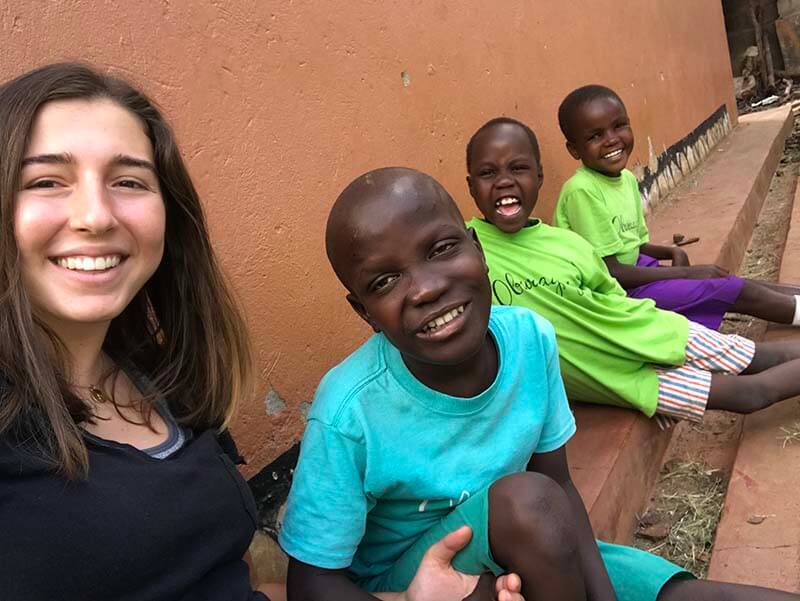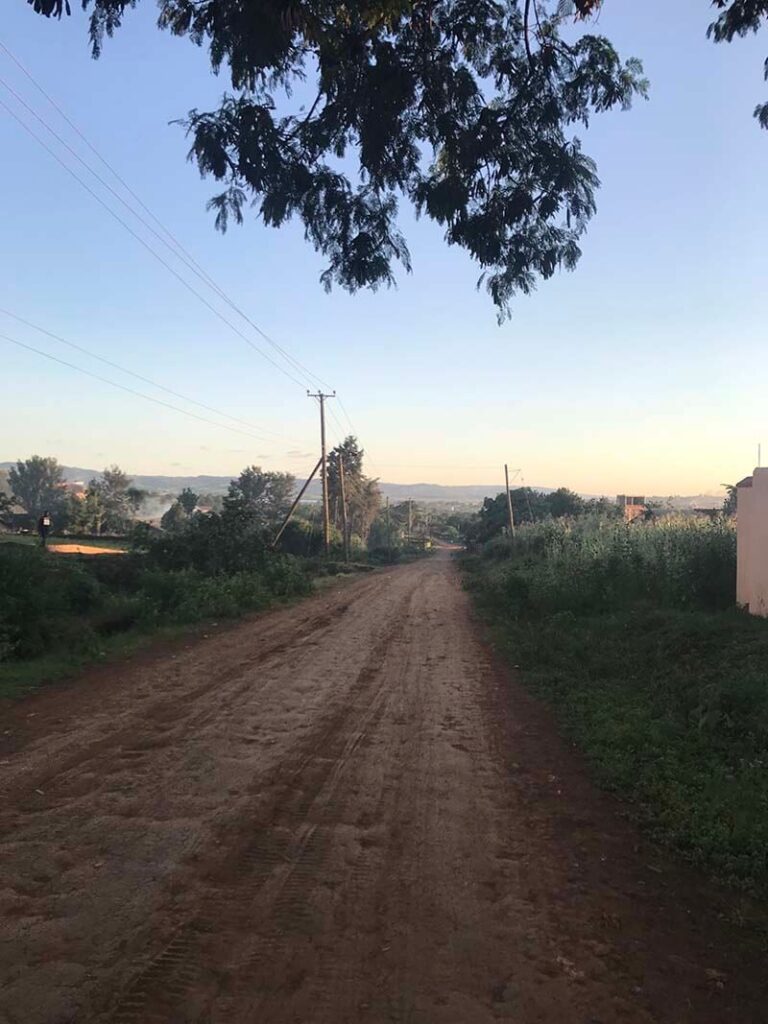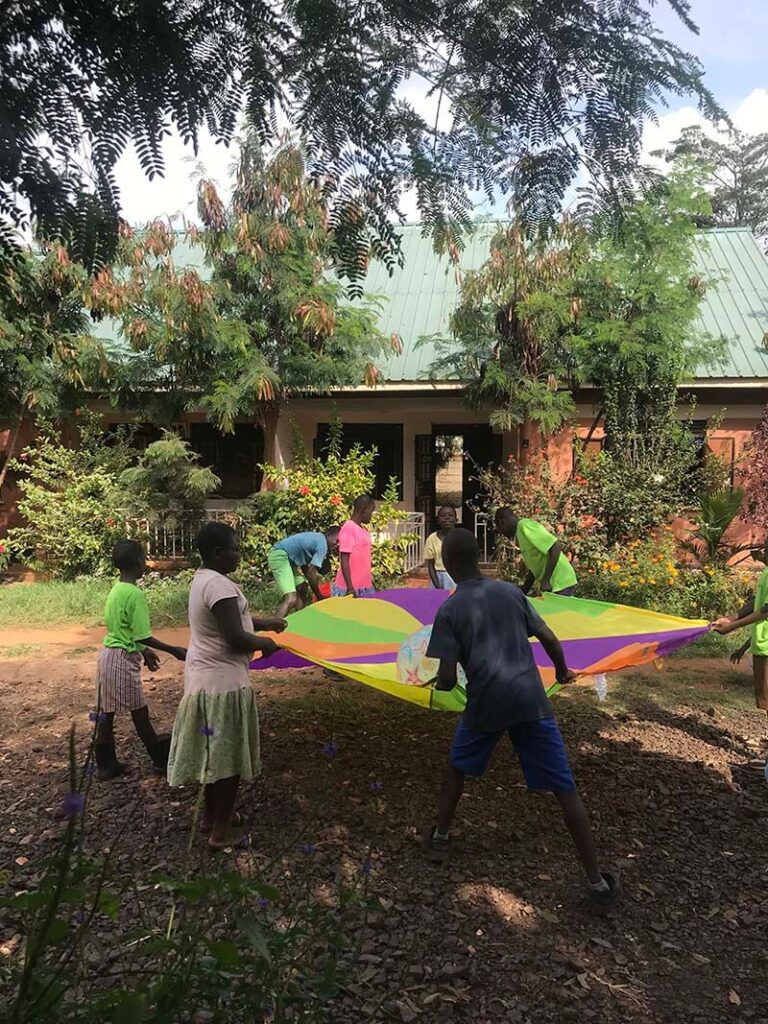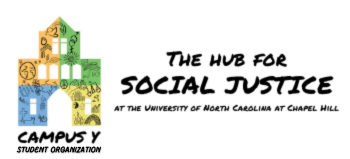
The Global Engagement Fellowship (GEF) supports UNC Chapel Hill students conducting international social-justice oriented summer projects. The following blog was written by GEF recipient Alaina Plauche.
I’m in Jinja, Uganda. Outside the gates of our compound, I walk down the hill leading to the market in Walukaba East to buy some eggs and chapatti. I look ahead to see rolling hills lined with houses resting above an industrial sector that I know holds a putrid combination of manufacturing smells far from my nose’s reach: bread, poultry, leather, vegetable oil, and laundry. I observe a new roof on the ironically extravagant home being constructed across the road. I hear the tall cornstalks rustling in the wind, bathing underneath the strong equatorial sun. Boda boda drivers race up the hill on their rickety motorcycles fighting for our business, but we are walking to the market and wave them off. Past the fragrant samosa stand and the grill selling delicious, roasting corn, we turn the corner. Groups of uniformed children are walking home from school laughing with each other. Siblings, friends, and neighbors are playing together in the street or their yards. As we pass they exclaim with all the wonderment and joy in the world, “ A mzungu, a mzungu, a mzungu!”
 In East Africa, Mzungu is slang for a white person. At first, the chorus of “Mzungu, hi! A mzungu, hi! Mzungu, bye!” bothered me, especially coming from adults. I have become accustomed to hearing this now, after spending a month living in Jinja. However, as I have been traveling to more remote parts of the Jinja district for family needs assessments, the chorus has turned solely into “Mzungu, bye!”
In East Africa, Mzungu is slang for a white person. At first, the chorus of “Mzungu, hi! A mzungu, hi! Mzungu, bye!” bothered me, especially coming from adults. I have become accustomed to hearing this now, after spending a month living in Jinja. However, as I have been traveling to more remote parts of the Jinja district for family needs assessments, the chorus has turned solely into “Mzungu, bye!”
Why do the kids automatically yell “bye,” and not “hi”?
For just over a month, I’ve been interning at a non-profit school for children with disabilities called the Obwaagazi Children’s Foundation. Obwaagazi provides an open, caring space for children with disabilities – a very disenfranchised group in Uganda. Due to a lack of education and knowledge surrounding special needs and mental health, many Ugandans do not accept people with disabilities. There is no place in the society for them. They often have no access to education, no job opportunities, no medical aid, and no support system. While Uganda’s lack of support for mental health issues and special needs is very debilitating, the white savior complex and its inflicted damage on Uganda’s culture is perhaps even more harmful.
 Last week, Uganda forced the closure of 596 orphanages across the country. While this seems abrupt, and it is, the mandate aims to restore Uganda’s dependence and culture. Orphanages are not a traditional need in Ugandan society because their culture revolves around extended family. If a child became parentless or a relative is too old to live alone, any nearby family member would take that person in and care for them. Households can double or even triple in size. With the rise of tourism, missionaries, mzungus, and orphanages, this communal culture dissipated. There was no longer a familial responsibility to take care of extended members because they knew the orphanage run by mzungus down the road would take them in.
Last week, Uganda forced the closure of 596 orphanages across the country. While this seems abrupt, and it is, the mandate aims to restore Uganda’s dependence and culture. Orphanages are not a traditional need in Ugandan society because their culture revolves around extended family. If a child became parentless or a relative is too old to live alone, any nearby family member would take that person in and care for them. Households can double or even triple in size. With the rise of tourism, missionaries, mzungus, and orphanages, this communal culture dissipated. There was no longer a familial responsibility to take care of extended members because they knew the orphanage run by mzungus down the road would take them in.
So, why do Ugandan children automatically greet me with “Mzungu, bye?” Because the white savior complex has created a culture of mzungus constantly coming to help – and more importantly – always leaving. They are used to mzungus and their fleeting support.
Although this move to simultaneously close nearly 600 orphanages seems sudden, it is necessary for Uganda to develop as a country through its own culture. Every Ugandan I know is very resourceful and resilient. They use caveras (plastic bags) for just about anything: footballs, cooking, fixing leaks, and more. After the main part of plants are eaten, banana leaves and corn husks are woven to make baskets and dolls. Garden hoses are used as pipes. Brooms are fashioned out of dried palm tree leaves and grass. Sachets (plastic pouches of water, juice, or alcohol) become pots for plants that are being nursed for sale. Plastic bottles and cans are used for irrigation systems on farms. Everything has a purpose, and then another, and then another, until it can no longer be used. Ugandans are fully capable of empowering their own communities through their own cultural ways without the invasion of mzungus.
In no way am I suggesting the mzungus here are bad people or that they should not give their aid where it is needed. I am suggesting that we end the white savior mindset and stop presuming that we know how to help. Instead, we should enter communities and identify a real problem, empower local individuals to become leaders, and let them decide how to fix the systematic issue. Do this, not only in Uganda but for the entire global aid system, and we can fix worldwide issues while also sustaining different, beautiful, traditional cultures.
